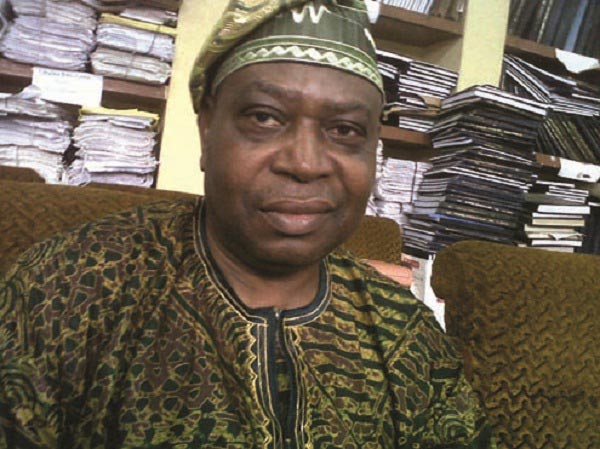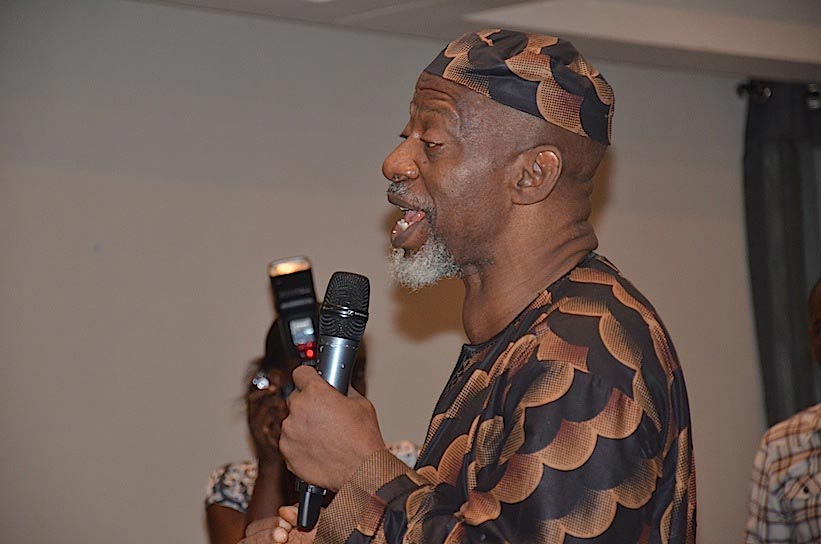by Odia Ofeimun
Yes, wherever he stood or sat, he represented so many unspoken Nigerians who normally are not heard. An intrepid advocate of good causes and a defender of the millions in society who are unable to speak for, or defend themselves, he remains difficult to describe merely in a cliche-ridden manner as just one among a civil society crowd. The reason is that he had a consummate inclination to seek and give organizational expression to his pursuit of popular goals
I stand here, bemused, unable to determine whether I am trying to recall the day I met Festus Iyayi for the first time or I am merely responding to the unreality of his death. Was it an accident or a murder? I am seized by Professor Wole Soyinka’s remonstration that “with the mortuary photos of the late Festus Iyayi just published in The NEWS, the world is waiting and watching if the corpse shown in that image will be interred without a coroner’s inquest. I am fully in agreement with him that. “To allow this to happen is to make all of us accessories to a possible crime. It means we are now attuned to the culture of impunity and have forfeited all claims to elementary citizen security. Or are we, have we, not?”
This is a simple question that drives into the very trauma at the heart of Festus Iyayi’s death. The unvarnished truth remains: whether it was an accident or a straight-out murder, his death is not retrievable from the unwholesome context of the nation wide strike by the Academic Staff Union of Universities, ASUU, whose negotiation with the Federal Government Festus Iyayi was on his way to attend to, when, as TheNews reports it, “a police escort van in the convoy of Governor Idris Wada of Kogi State rammed into the bus” in which the university teachers were travelling. The sequence of events thereafter may indeed require a coroner’s definitive pronouncement. The incontrovertible position, too self-evidently, is that Festus Iyayi did not just die; he was killed. And, this cannot be blamed on the poorly maintained Nigerian roads but, quite pointedly on the rude culture of convoys and sirens which offered the cover for the rest of the story. Nor is there much left to the imagination of readers of newspapers who have seen the gory pictures of Festus Iyayi’s corpse that emerged from the mortuary. ‘Who killed Festus Iyayi?’ is therefore quite a deft, inexorable question that does need to be asked, and if possible, answered. If possible? that is the rub. As Professor Soyinka rightly observed, the tributes that we are all obliged to mount must ring hollow unless the nation “be placed in knowledge which assures that “Beyond all doubt”, is a protective armour for each one of us, no matter where and how”. ‘
Still, it cannot be denied that there is an easy helplessness that the circumstance of Festus Iyayi’s death almost promotes, because of the sheer run of unsolved crimes in our society. It is a factor of the highly manipulative indifference of officialdom, based on the rather tested but abnormal sense of inefficacy which allows that, with the passage of time, even pent up rage will simmer down. Such a factor however merely lays the basis for the next visitation of the same or similar debasement that belittles our humanity until a strong capacity for self-forgetting becomes the norm. I call it self-forgetting because it motivates and overtakes our bored acceptance of the unacceptable. In this regard, I admit that, ritually, there are cynics who may begin from the worldly wise notion that nothing we do can bring the dead back to the world of the living. They may proceed to the scarred wish that the living should be allowed to carry on with their lives. But the self-abandonment which it involves is a whole whale when we realize that this is more than just one man’s life or one man’s death.

In this particular case, we are in the midst of the physical despoliation of a man who, even when we were not paying attention, had become, in so many ways, a factor and standard by which our society determined heights of integrity and self respect, moral dignity and genuine fellow-feeling. These are heights to which we accede when we are not too distracted by the business of merely filling our stomachs, sometimes with pure junk, worshiping our own traducers in order not to get hurt, or forego some transient largesse, or benefice. Festus Iyayi had become in a lot of ways quite a multitude, representative of a rare quality that only a few possessed in our midst or were minded to assert. He had become, too definitively, one among a rare crop of Nigerians, a select few, who truly make Nigeria look like a country; that is, in the sense in which a country is not to be measured by a cult of anything goes or a drifting with the flotsam and jetsam of the moral poverty so weighted all around us. It does need to be stated that by the manner of the causes he championed and the grit, fervor and high sense of responsibility that he brought into service in all his advocacies, Festus Iyayi had become a man who represented more than just himself but was always, I repeat, a multitude.
Yes, wherever he stood or sat, he represented so many unspoken Nigerians who normally are not heard. An intrepid advocate of good causes and a defender of the millions in society who are unable to speak for, or defend themselves, he remains difficult to describe merely in a cliche-ridden manner as just one among a civil society crowd. The reason is that he had a consummate inclination to seek and give organizational expression to his pursuit of popular goals. For him, organization was always the weapon of the weak. In a world in which the strong are usually well-heeled and rather over-mobilized, Festus Iyayi never allowed the near occult belief in the power of the powers that be to upstage his firm commitment to ameliorating wrongs and resisting the power-besotted ways of the already over mobilized despoilers. He stood apart in a notionally profitless zone, pooling special skills, intellect and will, to make things change and to make change worthwhile especially for the poorly situated who are always the majority in all under developed societies.
He was forever seeking to strengthen organizations which pursue creativity and speak out for, not only the near, but the distant future : organizations such as the Association of Nigerian authors, and the Pan African Writers Association, the Nigeria Labour Congress, the workers movement as a whole, and the Academic staff Union of Universities, the last of which he would truly have preferred to die fighting for even if not in the manner in which it has now transpired. He was more interested in protecting the thinking lobe of society as well as the solidary muzzle by which change is made possible. Let’s face it: to let the death of such a man become part of ritualized cynicism must amount to a case of self-forgetting by a society that could, unless it retreats, end up in a state of complete anomie and absurdity.
Necessarily, the belief that such a fate can be avoided is what should make us, as citizens, want to have knowledge of what actually happened, if only as a way of learning something that may disallow a repeat. A society that can afford to be so complacent about the continued sustenance of impunity, ought to see the prosecution of such knowledge as the basic minima in a normal society. Or is our own not a normal society? I ask because when we consider the many deaths that stand on the conscience of the nation for which there may well now be a need for a national committee of unsolved murders, deaths and assassinations, it boggles the mind. Some of those deaths may properly be regarded as executions in the light of the involvement of formal security agents. In such situations, yet to enjoy fair investigations or formal judicial interventions after so much passage of time, it is to be hoped that ‘beyond any doubt’ must be made a fount of knowledge that removes abnormality from our society. It is a matter of showing that those who hold dissident views, or are in opposition to the powers that be, are free to enjoy the right, full right, to life. What the alternative suggests, especially as the case of Dele Giwa, and Bola Ige, suggests, makes plain murder in our society an instrument of governance.
It leaves the rest of us wondering whether the state is not thereby to be held responsible for educating ordinary citizens to deploy crass violence as normal fare – in the way that, these days, we see it so frequently all around us. Even then, the cases of plain murder that we know must be placed side by side with the others which form emergent patterns, still requiring proof, in which death has been visited upon people who are in the midst of fighting causes that most normal societies leave at the level of arguments and debates. So to say, Nigerian progressives of a radical cast cannot forget, for instance, the death of Chima Ubani in an accident in the process of a national strike by workers. An accident may be just an accident!
But a sitting government that finds itself host to the death of a major negotiator in the process of resolving a crisis like the ongoing strike of University teachers, owes itself and all a responsibility to provide a firm basis for faith in its capacity to defend its opposition instead of seeing every disagreement in terms of enemy action. A clearing of the air is what an inquest is all about. And, a seasoning of the articles of democracy, as a conversation, is what it favours by laying ghosts to rest within the certainty that a difference of opinion is too normal to incur the almighty wages of sin which is death.
• To be continued.
Odia Ofeimun delivered this lecture under ASUU auspices, as a tribute to Professor Festus Iyayi, at the University of Benin, Benin City on December 5, 2013.
The opinions expressed in this article are solely those of Odia Ofeimun.







